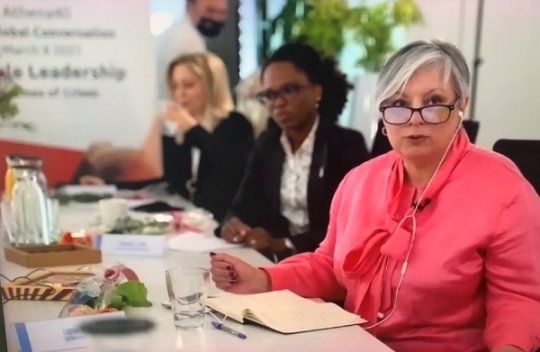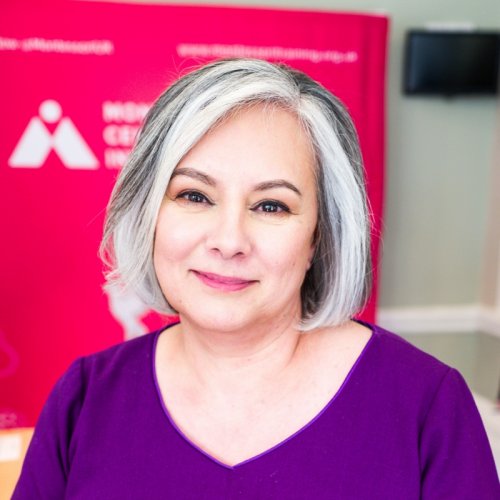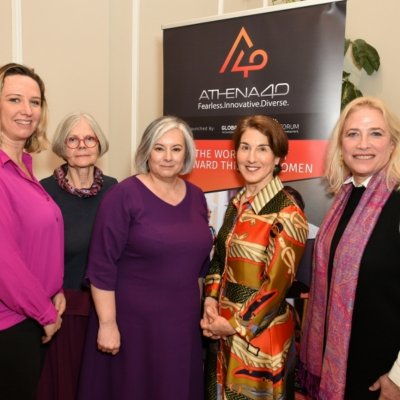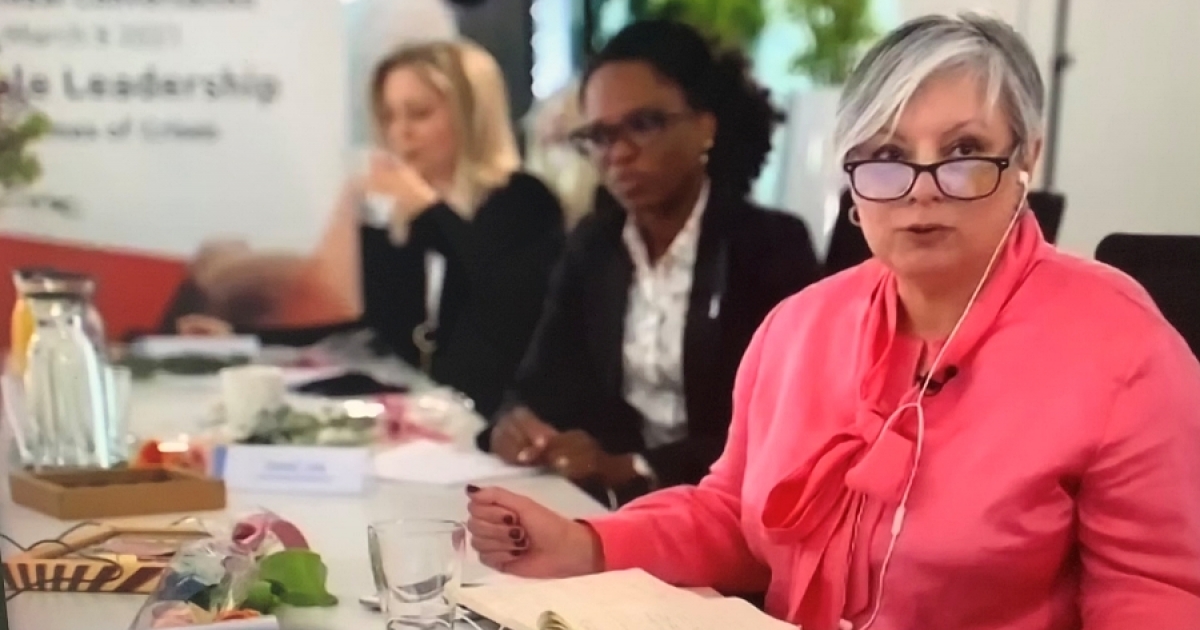“The Pandemic Will Lead to Radical Changes in How the World Functions”
Q: Can you tell us a bit about yourself? Please include about your background and life’s journey.
A: I am the first woman in my family to have a career. Originally my family were political refugees from Franco’s Spain, and it was only because I was born and raised in England that I had the opportunity to have a career. I spent the first third of my professional life in the commercial sector and then moved into the NGO world when I returned from a stint working as a volunteer in a refugee camp in Croatia during the war in the Balkans.
The camp I was working and living in was half refugee camp for women and children and half hospital for the walking wounded. It was also there that I met my husband who was a soldier and had been wounded. When he was not receiving treatment, he would come and help the volunteers. When we returned to the UK, I decided that I would not continue with my business but instead go into the not-for-profit world. My first role was with the National Playing Fields Association, but my first CEO role was with Galapagos Conservation Trust. I am now on my third CEO role and fourth organisational transformation and have been a CEO for 20 years. However, my first contact with the NGO world was not professional. At 18, I helped set up the Amnesty International Working Group for Children at a time when children’s rights were not part of Amnesty’s mandate. Not only did the group of volunteers, my co-creator and I gathered around us, successfully lobby Amnesty to make it part of its mandate but also, we worked, as volunteers, on campaigns to save children who were being tortured or had been imprisoned because of their parents’ political beliefs or jobs. During my commercial career, I continued to volunteer for several charities such as Save the Children, The Children’s Society and SOS Racisme when I live in Spain.
Q: Has Education always been important to you? Why?
A: If I had not had an education, I would not have had the opportunity to have a career and the life that I have had. The difference between my female cousins of my age and myself is very sharp because I did have that opportunity. Education is transformational and essential to allowing children to fulfil their potential as adults.
Q: You work a lot with children and youth. What are some of the lessons you have taken from younger people?
A: Children and young people look at the world in a way that we have forgotten to do so as adults. To ignore this fresh perspective of life, limits us as human beings. Also, particularly young children, don’t understand why something can’t be done; they don’t set themselves the obstacles that we do as adults so for them anything is possible. I love that optimism and try not to lose it when I am making plans. Finally, there is a misperception that children are not patient. This is patently not true. If you watch a child doing something again and again until they have achieved a result, it shows how patient children can be and, of course, whilst they are doing that they are learning. From children I have learnt how to keep trying to achieve something through patience and trying different ways.
Maria Montessori was also a female pioneer, advocating for equal pay for equal work as far back as 1896. She was unafraid to try new things and to face ridicule but never lost sight of who she was as a person and as a woman.
From her I have learnt that the importance of spending every day interacting with nature.
Q: How did your life change during the pandemic?
A: Personally, it was a year that was life changing. Just a week before the pandemic I was diagnosed with cancer which could not be treated due to lockdown. So, throughout the first lockdown, I was self-isolating. Luckily, I was able to be treated in June but then had to self-isolate at a time in the UK when everyone was enjoying the summer and going out because of the Government’s “eat-out to help-out campaign”. In late September, needing a holiday and time to recuperate whilst in remission, my husband and I brought forward our plans to buy a house in Croatia and bought a 19th century wooden house in the Croatian countryside where I could work from home. My plan had been to spend 50% of my time working from home in the Croatian countryside and 50% of my time in London but various lockdowns and travel restrictions have not allowed that to happen yet. I do miss my friends and work colleagues in London but cannot complain at waking up to the sound of bird song, making phone calls whilst walking in the woods at the bottom of the garden and watching the seasons change from my home office window.
Q: What do you consider as your biggest accomplishments to date?
A: I think my biggest accomplishment is probably yet to come. I know I have been fortunate enough to have achieved a great deal and to have had the opportunities to transform lives; all of this has been thanks to being surrounded by intelligent, supportive, dedicated people. I still feel that there is more that I can do, even though I am not sure what that will be yet. I expect that I will not be able to answer that question until I get to the end of my life and can look back on everything.
Q: Social responsibility: How can we nurture this in our societies?
A: This must be done through role modelling by adults. If those in positions of authority or with a media presence do not behave responsibly, how can we expect anyone else to behave? The media also has a role to play by highlighting not just bad news and bad behaviour but also good behaviour. It is interesting how the recent death of HRH Prince Philip has led to a plethora of stories of his charitable work and his virtues. Something that was not reported during his lifetime. We shouldn’t wait until someone has died to celebrate good work.
Q: What are some of the key challenges for youth in the decade ahead?
A: I believe the pandemic will have long-term societal, political, economic and mental health effects that we have not yet begun to consider. History shows us that events of this nature lead to radical changes in how the world functions and often further upheaval. Young people will not only be affected but they will need to be the ones that shape how those changes work.
“In Montessori we do not differentiate in tasks between boys and girls. Both do all activities including the activities of everyday living.”
Q: Do you think that women make better leaders? What defines a good leader?
A: I don’t think women necessarily make better leaders, but I do think that women of my generation, who are likely to be at the stage of their career to be leaders, have been able to break past the old male, hierarchical way of thinking so are currently better at dealing with complexity and change. We are not afraid to ask questions, to show our emotional intelligence and be collaborative. I think the younger generation of leaders, of whatever gender, are able to show those qualities in the workplace. Being a good leader is about being confident enough to give up power to others and being unafraid to consider that you are wrong.
Q: As a call to action for the UK government: What would you rank as three key priorities in Education?
A: I would prioritise as follows:
- Investment in quality early years – the early years are the most important in the development of a child but is the area with the least Government investment.
- Understanding that what are considered “soft skills” are actually essential life skills, particularly as the world of work changes to require those skills, and ensuring they are incorporated into the education system in a meaningful way.
- That testing at an early age is meaningless. Children develop at different speeds and making a child feel that they have ‘failed’ is not helpful. Sweden is considered to have the best education system in the world, and their children are assessed by their teachers and not external exams.
Q: Does the Montessori method nurture Gender Equality? How?
A: In Montessori we do not differentiate in tasks between boys and girls. Both do all activities including the activities of everyday living. Boys and girls are expected to wash dishes, are taught to sweep up and clean after themselves, do maths, science, etc.
Q: Girls and young women in UK public and state schools seem to suffer bullying and violence. How can this change?
A: I think it comes down to respect for each other. In Montessori, the theme of respect is very strong. We teach children to respect themselves and to respect others. If you respect yourself and you respect others, you are unlikely to behave in the ways that we have been hearing about. It is also about role modelling good behaviour by adults about what healthy relationships look like and this includes in our popular culture. The prevalence of misogynistic porn and its availability to young minds is not helpful. However, even in popular culture, how we portray relationships and young women needs to change. For example, in crime films or series, we often see brutalised and naked young women but don’t see male victims shown in the same way.

Q: Global Thinkers Forum and Athena40: How important is it to connect values driven thought leaders and to also engage women (and men) in conversations?
A: It is essential. We have big challenges to deal within the coming years and we can only overcome these if we are united as a society and lead by leaders who have the right values to make choices that are aimed at creating an equitable society. We have seen what leaders without values can do throughout history. Do we really want to make the same mistakes again and again?
Q: What is a message that you wish to communicate?
A: We are at the start of a long journey of global societal change. Climate change, the long-term effects of the pandemic, economic challenges, societal and political upheavals are all on the horizon. Whilst it is right that we should celebrate the small wins, such as the lifting of some restrictions, we fool ourselves if we think that we can go back to how things were before. We can either bury our heads in the sand and pretend that life goes on as before or we can despair, or we can use this as an opportunity to create a fairer and more sustainable world. My vote is that we go for the last option.

Leonor Stjepic
CEO, Montessori Group
Leonor Stjepic is a multi-award winning leader, spending the first part of her professional life in the private sector.
However, she has been involved with charities for much longer; at the age of 18 she co-founded the Amnesty International Working Group for Children campaigning for child victims of torture and successfully lobbying Amnesty to make children’s rights part of their mandate.
During the Balkans war, she worked with children and women who were victims of the war. Coming back to London, Leonor started working with UK charity, Fields in Trust.
Her next role was for human rights charity, Index on Censorship, before becoming the first Executive Director of the Galapagos Conservation Trust.
Her next CEO role was at research charity, RAFT. During her time there, Leonor created a life sciences company and was its CEO for five years, whilst concurrently serving as CEO of RAFT. Under her leadership both organisations won several international awards.
In June 2018, Leonor took up her fourth CEO role at Montessori Group.
Leonor is a firm believer in mentoring and mentors a range of people at different stages of their careers.
Leonor has personally won several awards for leadership.
Published: 13/04/2021



